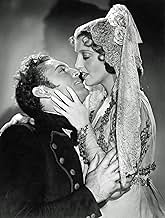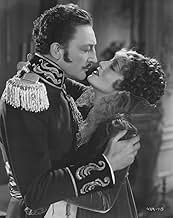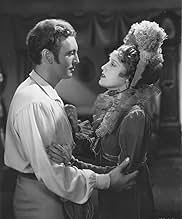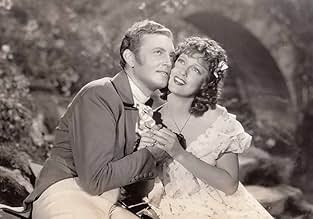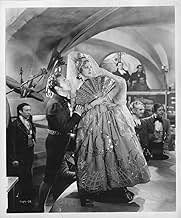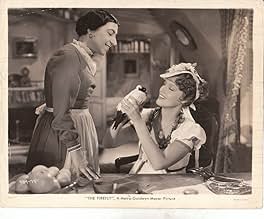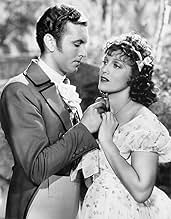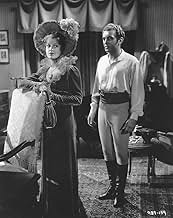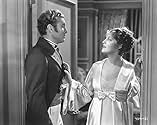Durante las guerras napoleónicas, las aventuras y amores de una espía y cantante de cabaret española.Durante las guerras napoleónicas, las aventuras y amores de una espía y cantante de cabaret española.Durante las guerras napoleónicas, las aventuras y amores de una espía y cantante de cabaret española.
- Dirección
- Guionistas
- Elenco
- Premios
- 3 premios ganados en total
Douglass Dumbrille
- Marquis de Melito
- (as Douglas Dumbrille)
Tom Rutherford
- King Ferdinard
- (as Tom Rutherfurd)
Corbet Morris
- Duval
- (as Corbett Morris)
Victor Adams
- Jail Guard
- (sin créditos)
Monya Andre
- Civilian Wife
- (sin créditos)
Sam Appel
- Fruit Vendor
- (sin créditos)
Pilar Arcos
- Gypsy
- (sin créditos)
Hooper Atchley
- French Soldier Requesting Flowers
- (sin créditos)
Opiniones destacadas
If it wasn't for "Donkey Serenade", this would have been a total loss as a piece of gaudy MGM entertainment for the masses in the 1930s. JEANETTE MacDONALD gives her all as a sexy spy who tries getting potentially harmful information from French officers, but it's all pretty preposterous and finally much too long for sustained interest.
The only sequence that comes off as completely charming is the "Donkey Serenade" episode with ALLAN JONES singing his heart out as he rides a dusty trail following her carriage. Jones is a fine match for MacDonald but probably left MGM when he realized it was Nelson Eddy's territory.
The score is kind of lackluster, the sets are opulent in typical MGM grand style manner, but the plot is never lively enough to keep one's attention riveted on the plodding story of spies and counter-spies in ye olde Spain. Everyone tries hard, but it just seems to stall somewhere near the middle and never recovers.
Trivia: Did Jeanette MacDonald ever show her real hair in a costume film? She must wear at least 25 wigs and hairdos in this film alone, changing her far from simple hairstyles from scene to scene more often than Lana Turner ever changed her costumes in glamorous roles. There must have been a special Jeanette wig department at Metro just for the occasion.
The only sequence that comes off as completely charming is the "Donkey Serenade" episode with ALLAN JONES singing his heart out as he rides a dusty trail following her carriage. Jones is a fine match for MacDonald but probably left MGM when he realized it was Nelson Eddy's territory.
The score is kind of lackluster, the sets are opulent in typical MGM grand style manner, but the plot is never lively enough to keep one's attention riveted on the plodding story of spies and counter-spies in ye olde Spain. Everyone tries hard, but it just seems to stall somewhere near the middle and never recovers.
Trivia: Did Jeanette MacDonald ever show her real hair in a costume film? She must wear at least 25 wigs and hairdos in this film alone, changing her far from simple hairstyles from scene to scene more often than Lana Turner ever changed her costumes in glamorous roles. There must have been a special Jeanette wig department at Metro just for the occasion.
France and England are at war. Napoleon has placed troops in Spain "to protect the Spanish" in case England invades.
There is a beautiful cantina singer (and dancer!) named Nina Maria (Jeanette MacDonald) whom men fight over. She works as a spy for Spain. When Napoleon invites Ferdinand--who appears guileless--to France for a meeting, Nina Maria must leave for France immediately to determine if Napoleon's intentions are honorable.
She is pursued there by Don Diego (Allan Jones), a man smitten by the senorita. Along the way, he tries to charm her by singing "The Donkey Serenade"--one of the most memorable moments in the film.
When they arrive in Bayonne, France, things get complicated. The senorita discovers someone is on to her. The love story becomes more political as Nina Maria must make alliances based on trust. Will she let her heart guide her actions? What is Napoleon's true objective?
The two leads are excellent. Much of the surrounding cast portray military characters and they are very strong.
The lavish sets and a large number of extras give the film a feeling of richness, as when Joseph Napoleon and his military escort ride into Madrid.
Part romance, part political intrigue, "The Firefly" entertains while Jeanette MacDonald shines.
There is a beautiful cantina singer (and dancer!) named Nina Maria (Jeanette MacDonald) whom men fight over. She works as a spy for Spain. When Napoleon invites Ferdinand--who appears guileless--to France for a meeting, Nina Maria must leave for France immediately to determine if Napoleon's intentions are honorable.
She is pursued there by Don Diego (Allan Jones), a man smitten by the senorita. Along the way, he tries to charm her by singing "The Donkey Serenade"--one of the most memorable moments in the film.
When they arrive in Bayonne, France, things get complicated. The senorita discovers someone is on to her. The love story becomes more political as Nina Maria must make alliances based on trust. Will she let her heart guide her actions? What is Napoleon's true objective?
The two leads are excellent. Much of the surrounding cast portray military characters and they are very strong.
The lavish sets and a large number of extras give the film a feeling of richness, as when Joseph Napoleon and his military escort ride into Madrid.
Part romance, part political intrigue, "The Firefly" entertains while Jeanette MacDonald shines.
The reviews here that say the movie is too long (or "too long for a 1930s musical") must be written by people from fleet street. The movie is as long as it needs to be for a nicely complex storyline, nicely told with lots and lots of beautiful music to entertain, and Jeanette even gets a lot of dancing and wonderful non-dance choreography through crowds of men that she tantalizes with her charm.
The love scenes between MacDonald and Jones are funny, sweet, captivating, and the necessary betrayals are handled well and understandably from both sides.
I loved every minute of this film and would not have wanted it shortened. All the songs are hummable and lively/romantic. MacDonald's intelligence and sense of humor underlie everything she does, as when she says to Jones after his beautifully sung love song, "Well, perhaps I shouldn't tell you this, but you know that part where you sing, 'My heart's your throne dear, my heart's your throne dear, There you shall rule alone...' with the music building just before the high note?"
"Yes?"
"I was wondering... but, no, perhaps I shouldn't tell you."
"Tell me."
"Well, I was wondering ... if you were going to make it."
Or when Jones complains to her, "You're always saying goodbye," and she replies, "All right then, I won't say goodbye. I'll just ... go."
Her comic timing is lovely.
In fact, she has never been lovelier than in this movie, and the two of them together are just a lot of doggone fun and romance.
The love scenes between MacDonald and Jones are funny, sweet, captivating, and the necessary betrayals are handled well and understandably from both sides.
I loved every minute of this film and would not have wanted it shortened. All the songs are hummable and lively/romantic. MacDonald's intelligence and sense of humor underlie everything she does, as when she says to Jones after his beautifully sung love song, "Well, perhaps I shouldn't tell you this, but you know that part where you sing, 'My heart's your throne dear, my heart's your throne dear, There you shall rule alone...' with the music building just before the high note?"
"Yes?"
"I was wondering... but, no, perhaps I shouldn't tell you."
"Tell me."
"Well, I was wondering ... if you were going to make it."
Or when Jones complains to her, "You're always saying goodbye," and she replies, "All right then, I won't say goodbye. I'll just ... go."
Her comic timing is lovely.
In fact, she has never been lovelier than in this movie, and the two of them together are just a lot of doggone fun and romance.
Spy-thrilla where Jeannette MacDonald must get napoleonic soldiers to reveal their secrets. Warren Williams (The Lone Wolf!) is the Major; Billy Gilbert who sneezed his way through films is the innkeeper. Douglass Dumbrille always played the bad guy, and here is the Marquis. Dance numbers, singing. It's Jeanette MacDonald, who always does operatic arias. Yawn. Pretty dated stuff. Intrigue. suspense. love triangles. It's a pretty dry period piece, which is never my first choice. Kind of a mata hari. Showing on Turner Classics. It's pretty well done, but moves pretty slowly. the songs keep bringing it to a screeching halt. I'd skip this one unless you're a fan of J. MacDonald. Directed by Robert Leonard... nominated twice, but never got the Oscar.
10guidon7
Wonderful mix of music, romance and comedy but I concede a trifle too long, the length however acceptable with these two. Jeanette MacDonald could do everything; sing beautifully, act as well and surprisingly (I just watched this one after many years) a gifted dancer. MacDonald and Jones are quite compatible and I can see where, had fate taken a hand, it could have been these two and not Nelson Eddy, not to downgrade Nelson's resonant baritone in any way. Allan Jones was a better actor, and was one of the finest tenors in movie history. There was one brief comic bit I found hilarious -- it was so short it may have been overlooked by many. Don Diego (Allan Jones) is singing the famous Donkey Serenade to MacDonald as she rides along in a coach. He sings the line "But try as she may, in her voice there's a flaw", to this jibe at her voice, Jeanette's displeasure shows in a grimace! The expert supporting cast is up to MGM'S standards; Warren William, Billy Gilbert, George Zucco, Douglas Dumbrille, Henry Daniell and even a one-line appearance by Ralph Byrd (a.k.a. Dick Tracy in the 1940's). I highly recommend this film, especially to fans of light operetta. The music is delightful and Jeanette and Allan give it their all. Jones' last appearance was a 1980 role on the Love Boat TV program. Upon retirement from the screen (big screen and little) he became a dentist, quite a surprise. I wonder if he sang for his patients? If he did I'm sure his waiting list was the envy of his fellow dentists.
¿Sabías que…?
- TriviaThe song "The Donkey Serenade" was not in the original stage production. It was written for the film, but the music was adapted from the song "Chansonette," from the stage version of "The Firefly."
- ErroresWhen by the bridge we see a female with very long black plaits walking with her beau across the bridge. Not long after we see a closer shot of them about to walk across the bridge.
- Citas
Don Diego: You have one bad habit.
Nina Maria Azara: Oh, yes? What?
Don Diego: You're always saying good-bye.
Nina Maria Azara: Very well then, I won't say good-bye. I'll just go!
- Créditos curiososEach time the dancing girls dance across the screen, a new screen credit is revealed.
- ConexionesFeatured in MGM Parade: Episode #1.25 (1955)
- Bandas sonorasLove Is Like a Firefly
(uncredited)
Music by Rudolf Friml
Lyrics by Bob Wright and Chet Forrest
Sung by Jeanette MacDonald
Selecciones populares
Inicia sesión para calificar y agrega a la lista de videos para obtener recomendaciones personalizadas
Detalles
- Fecha de lanzamiento
- País de origen
- Idiomas
- También se conoce como
- Tarantela
- Locaciones de filmación
- Alabama Hills, Lone Pine, California, Estados Unidos(Donkey Serenade sung)
- Productora
- Ver más créditos de la compañía en IMDbPro
- Tiempo de ejecución
- 2h 11min(131 min)
- Relación de aspecto
- 1.37 : 1
Contribuir a esta página
Sugiere una edición o agrega el contenido que falta


